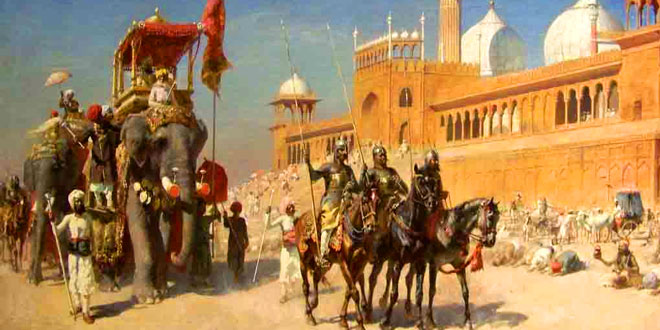Question: Why did Ala-ud-din Khalji introduced the market control policy? How did he enforce it?
Answer: Ala-ud-din Khalji introduced market control policy. He lowered the prices of all essential items such as food grains, sugar, cooking oil, cloth etc. Shopkeepers were asked to charge the rates fixed by the Sultan. He also appointed special officials to keep a check on the shop owners. Whoever was caught charging even a little extra or cheating with weights was punished severely. This idea of making goods cheaper was probably introduced because Ala-ud-din wanted to pay his soldiers a low salary. It allowed him to maintain a large army on limited resources.
Question: Who was Muhammad-bin-Tughlaq? “Muhammad-bin-Tughlaq’s schemes were well-conceived but poorly executed’. Discuss this statement with reference to his token currency experiment.
Answer: Muhammad-bin-Tughlaq was a very powerful ruler. He ruled from 1325 to 1351. He had great ideas and plans, but they failed as the common people could not understand them.
Muhammad-bin-Tughlaq minted coins of brass and copper for day to day use. These coins were equal in value as the pure silver coins and could be exchanged for silver coins from the royal treasury. This was well-conceived scheme to meet the world wide shortage of silver. However he took no steps to prevent the illegal minting of brass and copper coins. A large number of forged coins came into circulation for silver coins. Thus this well conceived scheme failed due to poor execution.
Question: Give two reasons to show that court of the Delhi Sultans was a “ceremonial” court.
Answer: The Sultan’s court was very ceremonial ‘Sijdah’ and ‘Paibos’ were performed before him. The Sultan sat on a throne built on raised platform. The princes, ministers, heads of different departments, ambassadors from foreign countries and other officials were given fixed places to stand.
Question: What was the Iqta system? Differentiate between the Iqta’s distributed during Khalji and Slave Dynasty and Tughlaq Dynasty.
Answer: The Iqta system was:
- During the Sultanate period, the nobles were given grants of land.
- This land was called Iqta. The nobles who received it were called Iqtadars.
- They collected taxes from the farmers living in their iqta. With this money, they maintained themselves, their families and also paid the soldiers under them.
- In return, they supplied troops to the Sultan, wherever, he needed them.
Distribution of Iqtas during Khalji and Slave Dynasty and Tughlag Dynasty:
Question: In whose reign did the Sultanate reach its farthest extent?
Answer: The Sultanate reached its farthest extent during the reign of Muhammad Tughluq.
Question: From which country did Ibn Battuta travel to India?
Answer: Ibn Battuta belonged to Morocco, Africa and travelled to India.
 Class Notes NCERT Solutions for CBSE Students
Class Notes NCERT Solutions for CBSE Students



My book is From orient Black Swan and my chapter name is The Delhi Sultanate.. I was surprised when I saw that NCERT have the same questions which I have it… Only some
Hi – your site is good and knowledgeable but our teacher has said us that you have to write the same answers he will tell students to mark, in KC Public School.
ITS VERY INFORMATIVE. I AM FROM B.D.M.I. AS I WAS READING MY HISTORY BOOK I COULD NOT FIND THE ANSWERS, SO WHEN I BROWSED HERE I FOUND IT…
Nice! Same question answer from my book (The Maurya school)